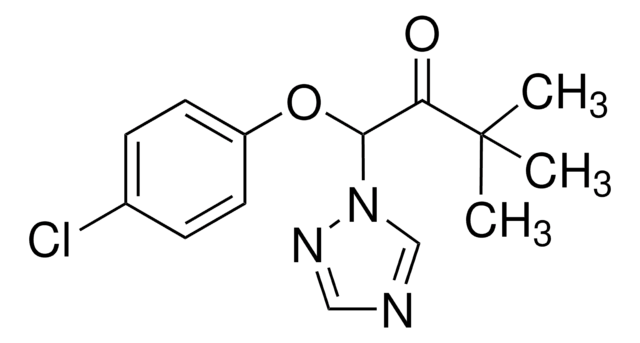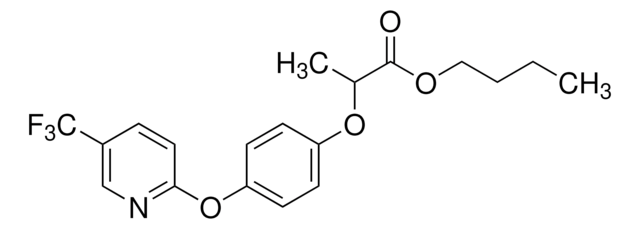CRM05394
Fenazaquin
certified reference material, TraceCERT®, Manufactured by: Sigma-Aldrich Production GmbH, Switzerland
About This Item
Recommended Products
grade
certified reference material
TraceCERT®
Quality Level
product line
TraceCERT®
form
solid
shelf life
limited shelf life, expiry date on the label
manufacturer/tradename
Manufactured by: Sigma-Aldrich Production GmbH, Switzerland
storage temp.
2-8°C
SMILES string
CC(C)(C)c1ccc(CCOc2ncnc3ccccc23)cc1
InChI
1S/C20H22N2O/c1-20(2,3)16-10-8-15(9-11-16)12-13-23-19-17-6-4-5-7-18(17)21-14-22-19/h4-11,14H,12-13H2,1-3H3
InChI key
DMYHGDXADUDKCQ-UHFFFAOYSA-N
Looking for similar products? Visit Product Comparison Guide
Related Categories
General description
Certified content by quantitative NMR incl. uncertainty and expiry date are given on the certificate.
Download your certificate at: http://www.sigma-aldrich.com
Fenazaquin is an insecticide/acaricide that belongs to the class of quinazoline compounds. It shows ovicidal activity against phytophagus mites found in agricultural crops of almonds, citrus fruits, and grapes. It is highly lipophilic and inhibits site I of the electron transport chain in mitochondria. Its acceptable daily intake (ADI) according to body weight is 0.005 mg/kg.
Fenazaquin was approved for use in the European Union on 1st June 2011 following a request for its inclusion according to Reg. 33/2008 and its approval for use expires on 31st May 2023. The maximum residue limit (MRL) for fenazaquin in citrus fruits is 0.5 mg/kg and 0.2 mg/kg in tree nuts. Fenazaquin is to be monitored in the Multiannual Control Programme for Pesticides Residues (MACP), run within the EU and EFTA in/on products of plant origin.
Application
It may also find following uses:
- Determination of trace levels of fenazaquin in raw almond samples using dispersive magnetic solid phase extraction (DMSPE) and gas chromatography-mass spectrometry (GC-MS)
- Development of a liquid phase microextraction method using eutectic solvents for extraction from different fruit and vegetable samples and gas chromatography determination
- Switchable solvent microextraction of pesticide residues from food and environmental samples
- Evaluation of 60 pesticide residues in 144 different fruit and vegetable samples by LC-MS/MS method
- Study of matrix effects in pesticide residue analysis in different citrus fruits using ethyl acetate for extraction and Ultrahigh-Performance Liquid Chromatography–High-Resolution Mass Spectrometry for determination
- Residue analysis of 64 pesticides from various groups by nanoflow liquid chromatography-mass spectrometry (LC-MS)
Recommended products
Legal Information
Signal Word
Danger
Hazard Statements
Precautionary Statements
Hazard Classifications
Acute Tox. 3 Oral - Acute Tox. 4 Inhalation - Aquatic Acute 1 - Aquatic Chronic 1
Storage Class Code
6.1C - Combustible acute toxic Cat.3 / toxic compounds or compounds which causing chronic effects
WGK
WGK 3
Flash Point(F)
Not applicable
Flash Point(C)
Not applicable
Choose from one of the most recent versions:
Certificates of Analysis (COA)
Don't see the Right Version?
If you require a particular version, you can look up a specific certificate by the Lot or Batch number.
Already Own This Product?
Find documentation for the products that you have recently purchased in the Document Library.
Our team of scientists has experience in all areas of research including Life Science, Material Science, Chemical Synthesis, Chromatography, Analytical and many others.
Contact Technical Service










